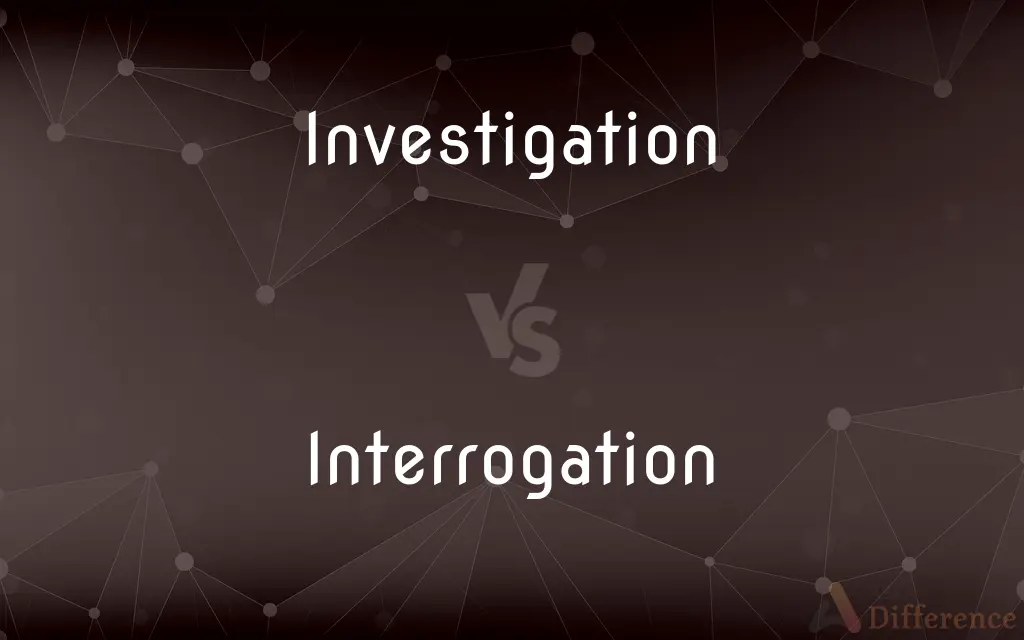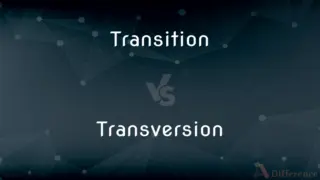Investigation vs. Interrogation — What's the Difference?
Edited by Tayyaba Rehman — By Fiza Rafique — Updated on March 16, 2024
Investigation is a broad process of inquiry to uncover facts about a case or situation, involving various methods, while interrogation is a focused interview or questioning of a suspect or witness to elicit information related to an investigation.

Difference Between Investigation and Interrogation
Table of Contents
ADVERTISEMENT
Key Differences
Investigation encompasses the overall process of examining, studying, or inquiring into a matter or case to gather facts, evidence, and information from a variety of sources. It is a comprehensive approach that can include observation, research, interviews, and analysis. On the other hand, interrogation is a specific technique used within the context of an investigation, primarily involving the direct questioning of suspects or witnesses to extract crucial information or confessions related to the case at hand.
While an investigation aims to construct a detailed understanding of an event or activity, collecting evidence from diverse sources and methods, interrogation focuses on gaining specific pieces of information from individuals through direct questioning. This demonstrates the broader scope of investigation compared to the more focused and interpersonal nature of interrogation.
Investigators may use multiple tools and approaches, such as forensic analysis, surveillance, and data examination, to build a comprehensive picture of the situation. Conversely, interrogation is typically conducted in a controlled environment, where trained personnel apply various psychological techniques and strategies to encourage or compel subjects to divulge information.
The process of investigation is often initiated to explore suspicions, allegations, or to solve a mystery, without initially having a clear direction or suspect in mind. Interrogation, whereas, is conducted when there is some degree of suspicion or evidence pointing towards specific individuals, making it a critical step in validating or refuting hypotheses formed during the investigation.
Investigations can be carried out in various fields, including criminal justice, journalism, academic research, and corporate compliance, demonstrating its broad application. Interrogation, on the other hand, is more narrowly defined and primarily used within the context of law enforcement and legal proceedings, highlighting its specialized role in the investigative process.
ADVERTISEMENT
Comparison Chart
Definition
A comprehensive process to uncover facts about a case or situation
Focused questioning to elicit information related to an investigation
Scope
Broad, encompassing various methods and sources
Narrow, centered on direct questioning of individuals
Purpose
To gather evidence, understand events, solve mysteries
To obtain specific information or confessions from suspects or witnesses
Techniques
Observation, research, interviews, forensic analysis
Psychological strategies, structured questioning
Application Fields
Criminal justice, journalism, academic research, corporate compliance
Primarily law enforcement and legal proceedings
Compare with Definitions
Investigation
The process of systematically examining a situation to uncover facts.
The police launched an investigation into the burglary.
Interrogation
The process of asking questions to elicit information related to an investigation.
The suspect was brought in for interrogation.
Investigation
Aims to build a comprehensive understanding of events.
The journalist's investigation shed light on overlooked social issues.
Interrogation
Primarily used in law enforcement and legal contexts.
The interrogation was a key part of building the case against the accused.
Investigation
Involves gathering evidence through various means.
Her investigation into the company's practices revealed illegal activities.
Interrogation
Conducted by trained personnel using psychological techniques.
The interrogation techniques led to the revelation of critical evidence.
Investigation
Can be conducted across multiple fields.
The academic investigation contributed to new discoveries in biology.
Interrogation
A critical step in validating hypotheses in an investigation.
The suspect's interrogation confirmed the investigator's suspicions.
Investigation
Seeks to solve mysteries or answer questions.
The investigation into the missing artifact spanned several countries.
Interrogation
Focuses on obtaining specific information or confessions.
Through careful interrogation, the detective uncovered the truth.
Investigation
The action of investigating something or someone; formal or systematic examination or research
He is under investigation for receiving illicit funds
Interrogation
Interrogation (also called questioning) is interviewing as commonly employed by law enforcement officers, military personnel, intelligence agencies, organized crime syndicates, and terrorist organizations with the goal of eliciting useful information, particularly information related to suspected crime. Interrogation may involve a diverse array of techniques, ranging from developing a rapport with the subject to torture.
Investigation
The act or process of investigating
A politician under investigation.
Interrogation
To examine by questioning formally or officially.
Investigation
A careful examination or search in order to discover facts or gain information.
Interrogation
(Computers) To transmit a signal for setting off an appropriate response.
Investigation
The act of investigating; the process of inquiring into or following up; research; study; inquiry, esp. patient or thorough inquiry or examination; as, the investigations of the philosopher and the mathematician; the investigations of the judge, the moralist.
Interrogation
The act of interrogating or questioning; examination by questions; inquiry.
Investigation
An inquiry into unfamiliar or questionable activities;
There was a congressional probe into the scandal
Interrogation
A question put; an inquiry.
Investigation
The work of inquiring into something thoroughly and systematically
Interrogation
(dated) A question mark.
Interrogation
The act or process of interrogating or questioning; examination by questions; an instance of interrogating; inquiry.
Interrogation
A question put; an inquiry.
Interrogation
A point, mark, or sign, thus [?], indicating that the sentence with which it is connected is a question. It is used to express doubt, or to mark a query. Usually called a question mark; called also interrogation point.
Interrogation
A sentence of inquiry that asks for a reply;
He asked a direct question
He had trouble phrasing his interrogations
Interrogation
A transmission that will trigger an answering transmission from a transponder
Interrogation
Formal systematic questioning
Interrogation
An instance of questioning;
There was a question about my training
We made inquiries of all those who were present
Common Curiosities
What skills are important for conducting an interrogation?
Skills important for conducting an interrogation include understanding human psychology, effective communication, empathy, and the ability to detect deception.
Is interrogation always part of criminal investigations?
While common, interrogation is not always part of criminal investigations, especially if sufficient evidence can be gathered through other methods.
Can an investigation occur without an interrogation?
Yes, an investigation can occur without an interrogation, especially if it doesn't involve suspects or if information can be gathered through other means.
How do investigators decide when to conduct an interrogation?
Investigators conduct an interrogation when they have sufficient preliminary evidence or suspicion that directly involves individuals in the case.
Can the findings from an interrogation be used in court?
Yes, findings from an interrogation can be used in court, provided they are obtained legally and in accordance with rights such as Miranda rights in the US.
What is the main difference between investigation and interrogation?
The main difference is their scope; investigation is a broad process to uncover facts, while interrogation is a focused questioning technique within an investigation.
How do privacy laws affect interrogation and investigation?
Privacy laws impact both interrogation and investigation by setting boundaries on what information can be collected, how it's gathered, and how it's used.
What role do technology and forensics play in investigations?
Technology and forensics play a crucial role in investigations by providing scientific methods to analyze evidence and gather data, often leading to breakthroughs in cases.
Are there any alternatives to traditional interrogation techniques?
Alternatives include investigative interviewing, a more cooperative approach focusing on building rapport and encouraging open communication.
Can interrogation techniques vary between jurisdictions?
Yes, interrogation techniques can vary significantly between jurisdictions due to differences in legal systems, cultural practices, and ethical standards.
What ethical considerations are involved in interrogation?
Ethical considerations include respecting the rights of the individuals, avoiding coercion or undue pressure, and ensuring the interrogation is conducted legally and humanely.
How do investigators ensure the reliability of information obtained during interrogation?
Investigators cross-check information obtained during interrogation with other evidence, monitor consistency in statements, and use psychological assessment to gauge reliability.
Share Your Discovery

Previous Comparison
Elfin vs. Elflike
Next Comparison
Transition vs. TransversionAuthor Spotlight
Written by
Fiza RafiqueFiza Rafique is a skilled content writer at AskDifference.com, where she meticulously refines and enhances written pieces. Drawing from her vast editorial expertise, Fiza ensures clarity, accuracy, and precision in every article. Passionate about language, she continually seeks to elevate the quality of content for readers worldwide.
Edited by
Tayyaba RehmanTayyaba Rehman is a distinguished writer, currently serving as a primary contributor to askdifference.com. As a researcher in semantics and etymology, Tayyaba's passion for the complexity of languages and their distinctions has found a perfect home on the platform. Tayyaba delves into the intricacies of language, distinguishing between commonly confused words and phrases, thereby providing clarity for readers worldwide.














































